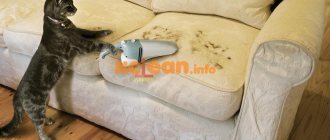( 3 votes, rating: 1.67 out of 5)
5589564
06/01/2021 owner reviews
Our cats' urine smells like ammonia. The ammonia in cat urine has a disgusting, unpleasant odor and lasts for quite a long time. As an indoor cat parent, you're probably worried about how strong the smell of her urine is. This is fine? Or should you be worried? Let's find out.
- Composition of cat urine
- What Can Cause Strong Urine Odor?
- What to do to remove strong urine odor
The Science Behind the Stench
When you "sniff" you may be wondering why cat urine smells so bad. It's not the urine itself that smells (although it can in some cases), but the fact that some cats may not urinate in the litter box, but rather on the carpet, in a corner, or anywhere else. Once the urine is absorbed into the object and begins to decompose, the bacteria in the urine release a typical characteristic odor.
Also, the second stage of decomposition of liquid urine waste is mercaptans (that's the bad smell that comes from skunks), so the longer the decomposition process takes (without treatment), the more mercaptans will be produced.
© shutterstock
Composition of cat urine
Cat urine is made up of various chemicals such as uric acid, creatinine, electrolytes, and urea. When urea is broken down, it produces amines, which further break down into mercaptans (also found in the feces of other animals and in skunk sprays). This is why your cat's urine smells bad. To make it easier to understand, ammonia is formed from the bacterial breakdown of urea, the main component of urine.
According to Pet Health Network, this is a normal cat urine odor for a spayed or neutered adult cat, and your cat's urine odor is likely not too strong. Normal urine will have a slightly pungent, sour odor that is fairly harmless and usually mild.
© shutterstock
However, if you notice that your cat's urine has a very strong odor that has already stung the nose, there is a chance that your cat may be on to something that requires the attention of a veterinarian.
Causes
We know why cat urine stinks, now let's look at the reasons why your cat might smell like urine:
- Matted fur . If you have a long-haired breed, such as a Persian, you may notice that the fur around the base of the breed has become matted. When this happens, the cat may not be able to clean the area as thoroughly as it should, which can result in urine getting into the fur.
- Overweight . Cats that tend to be overweight or obese may have a harder time keeping their hindquarters clean.
- Urinary tract infection . Bacteria causing the infection can cause your cat's urine to smell foul. Additionally, once an infection is present, your cat may feel the need to urinate more frequently or even drip some urine onto the skin and fur around the urethra.
- Arthritis pain . Older cats or cats that have a history of joint problems may develop arthritis. This painful condition can limit a cat's movement, especially towards the rear where urine and feces can collect.
- Chronic illness . Cats that are not feeling well reduce the amount of time they spend grooming themselves. Lack of daily care can lead to a strong urine odor in your cat.
Odor due to natural, non-pathological reasons
This phenomenon is associated with the animal’s menu and periods of sexual activity. If the cat is not neutered, then during weddings the urine begins to smell stronger. He also begins to actively mark his territory. The smell permeates the animal itself, making it unpleasant to hold.
© shutterstock
The second reason for the pungent odor that a cat’s urine gives off is feeding with a high content of fish and fish products. Because of them, the concentration of uric acid increases significantly, and even a small amount of urine remaining on the fur is enough to cause an unpleasant odor from the animal.
To eliminate the smell of urine in these two cases, it is necessary to reconsider the feeding of the pet, and also, if breeding is not planned, the cat should be castrated and sterilized.
What to do if your cat smells like urine?
An obvious, albeit temporary, solution is to wash your cat with cat shampoo.
To prevent the problem from occurring again, you should check the cat's rear end first. Are there tangles that can retain fluid? In this case, you will want to comb them. You can do this yourself or seek the help of a professional pet groomer.
© shutterstock
If your cat doesn't have matted fur on his back, you'll have to dig deeper to find out what's causing the problem. Monitor his behavior for any changes in diet, litter box use, or general behavior. If you notice changes in his normal behavior, make an appointment with your veterinarian. He will examine your pet and may take a blood test to determine the cause. Once diagnosed, be sure to follow the care instructions to eliminate the cause.
STRONG SMELL OF AMMONIA COMING FROM CAT URINE: NORMAL OR A CAUSE FOR CONCERN?
What should cat owners do if their pet’s urine starts to smell like ammonia? Should we sound the alarm or not pay attention, blaming everything on food? There is only one answer - you need to go to a veterinary clinic and have tests done to rule out diseases of the urinary and reproductive systems.
Often, the normal excretion of urine from the bladder is prevented by diseases that affect the lower part of the urinary system. Also, such diseases can lead to the death of a pet.
Lower urinary tract disease or feline urological syndrome (FUS) is a series of symptoms. They can cause more than one or several diseases. Symptoms may include frequent licking of the urinary opening, frequent urination, and bloody urine. In order to cure a cat, it is necessary to find out the cause of the disease:
- stones or sand in the bladder or urethra;
- accumulation of sediment from urine, the so-called urethral plug;
- cystitis;
- excessive water consumption or a weak bladder, resulting in urinary incontinence;
- tumor or various damage to the urinary tract;
- stress;
- spinal cord diseases;
- congenital pathology.
Diseases of the lower urinary tract can be caused by diseases of the endocrine system - hyperthyroidism and diabetes mellitus. Diseases of the lower urinary tract are usually found in cats over four years of age. However, males are susceptible to urethral blockage more often than females due to their narrower urethra.
A cat may have urinary tract problems if there is difficulty urinating or blood or other impurities are found in the urine. The animal may also lose bladder control and frequently visit the litter box. Often there is straining when urinating or the cat screams in pain. Signs of the disease may include: prolonged sitting in the litter box, fear of the litter box, puddles in unexpected places (especially if the cat is trained to use the litter box). Often the urine smells of ammonia, and the animal also experiences constant drowsiness.
When treating urinary tract diseases, a veterinarian may prescribe antibiotics, recommend dietary changes, and increase water intake. Sometimes surgery is necessary to remove bladder stones or tumors. A urinary catheter or various therapies are also recommended.
If the ammonia-like odor of cat urine is not a consequence of a disease, changes may have been made to the cat's diet. In any case, at the slightest suspicion, you should contact your veterinarian.
How to get rid of the smell of cat urine in the house
The problem with cat urine on any surface is that the longer it sits, the stronger the smell becomes. For this reason, you will want to clean it as soon as possible.
Have an old supply of vinegar in a spray bottle for spot spraying and odor removal. This works because vinegar is an acid that neutralizes the odor of fresh urine or the alkaline salts of old dried urine. If you need to cover a larger area, you can use one part vinegar to one equal part water. This is useful if you don't know where the smell is coming from and want to mop your floors and walls.
Enzyme-based cleaners are also effective at removing cat urine. These specially formulated products will change the organic composition of the urine, which can then be washed off or mopped away. They can be purchased at your local pet supply store or online.
Reasons for behavior
As already noted, the most important thing is to eliminate the cause of the behavior. If the animal marks corners and objects in the house in this way, then there are several solutions on how to wean the cat:
- castrate an animal;
- eliminate the cause of stress;
- rearrange furniture to meet your pet's needs;
- move the tray to a more convenient place;
- try using a different filler.
In any case, until the causes are identified and eliminated, it is impossible to achieve complete disappearance of the odor.
Treatment method and prognosis
Treatment is always prescribed by a veterinarian after receiving a diagnosis, since there are many reasons for changes in odor. First of all, it is necessary to eliminate the factor that “triggered” the changes in odor. If it is stressful, the cat needs to be provided with peace and allowed to adapt, treat him kindly and calmly.
If you have problems with nutrition, you need to balance your diet and switch to foods recommended by your doctor. If odor changes are caused by dehydration, your cat should have constant access to clean, fresh water. To do this, you can use special drinking bowls.
To avoid strong odors, male cats are spayed and female cats are neutered. If sexual desire is lost for several months, the release of hormones stops and the smell of urine becomes normal.
Any disease can only be treated by an experienced veterinarian after an accurate diagnosis has been made. Treatment depends on the type of disease and can be surgical or conservative (medication).
Other ways to remove urine odor
Stores offer a huge selection of special anti-odor products. Some of them are of high quality, while the effectiveness of others is easily questioned. The usual form of release of such a product is an aerosol or granules.
- Don't forget to clean the tray. Some animals simply cannot stand dirty trays and begin to look for a more convenient place to relieve their needs. Also, the tray itself can be a source of unpleasant odors.
- When retraining an animal, be sure to follow common sense and the advice of experts. If you just poke an animal's nose into a puddle, it can do everything to spite you.
Removing Cat Urine from Wood Floors
Cat urine leaves stains on wood that smell bad and can cause the floor to rot.
What we need:
- Paper towels
- Hot water
- 1 cup vinegar
- Hydrogen peroxide
Remove visible urine stains with paper towels. If urine has already soaked into the floor, remove as much of the stain as possible, but do not scrub the floor as you may scratch it.
Then gradually rinse the contaminated area with 1 glass of vinegar. It can be added in larger quantities depending on the degree of contamination. Rinse the surface with 2-3 cups of warm water until the vinegar is removed.
Wipe wet area with paper towels. Next, dampen a paper towel with hydrogen peroxide and gently wipe the surface. Dry it by wiping it again with paper towels.
You can also use this method if your cat has soiled your leather sofa. If possible, remove the leather cover to prevent urine and detergent from getting on the mattress. If the mattress is already stained with cat urine, it must be cleaned in the same way as in the previous option.
Smell due to illness
When a cat suffers from kidney and bladder diseases, they are often the cause of foul-smelling urine . It usually appears due to mild incontinence and inflammatory processes in the organs. In such a situation, in addition to the spoiled smell of urine, the animal is restless and experiences rapid weight loss. The cat looks sick and needs urgent treatment.
The owner must know exactly why his cat began to smell unpleasantly, and take all measures to eliminate the problem.
Source
What does it mean if your cat's urine starts to smell strong?
Cats come from desert regions where access to water is often limited, so their bodies have adapted to make do with a small amount of it and save every drop. As a result, their urine is very concentrated and, as a result, has a distinct, characteristic odor.
This is a property of all domestic cats, so owners need to be prepared for such manifestations and clean up after their pets more often. But a sudden and significant change in the usual smell indicates the appearance of serious disorders in the cat’s body, indicating the presence of pathologies or diseases.
Dental causes of halitosis
When bad breath appears, disease of the teeth or gums is first suspected. Bacteria use leftover food in the mouth to feed themselves. If you brush your teeth incorrectly or completely abandon this procedure, a large amount of plaque accumulates in your mouth. Its rotting causes a repulsive odor. If plaque is not removed for a long time, dense tartar forms, and the stench persists for a long time.
Caries and tooth decay can also cause an unpleasant odor. These are areas where large numbers of microbes accumulate. The breath of people who do not remove decayed tooth roots in a timely manner has a strong smell. A stench can occur when wearing braces, dental plates, dentures, under which food debris accumulates. Any foreign body in the mouth requires additional cleansing.
The condition of the oral cavity is affected by the production of saliva. In some diseases it is not liquid enough. Dryness of the oral mucosa occurs, self-cleaning processes are disrupted and bacterial growth is activated. A similar mechanism works in hot weather or when playing sports, if you actively breathe through your mouth.
Smoking also contributes to the appearance of halitosis. Components of tobacco smoke settle on the teeth and combine with soft plaque. Dry mouth contributes to changes in the composition of saliva and an increase in its viscosity. You can get rid of the smell only by defeating a bad habit.
Prevention measures (diet)
It is important to feed your cat correctly, do not give him pieces from your table, especially sausage, smoked meats, fried, salted foods. His diet should not be monotonous; food must be of high quality, because saving on health will definitely lead to problems.
Cats should not be allowed to become hypothermic; hairless breeds are especially prone to kidney damage, and, oddly enough, they are very fluffy. Pedigree cats are more susceptible to diseases.
Attention to animals, to the slightest changes in their behavior and timely contact with a veterinarian will help to avoid problems with the health of your pets.
Interesting topics
What else to read:
- Disabled cats: how to care? Contents of the article Solving urination problems Defecation problems How to feed a disabled cat? Massage and physical.
- The glorious descendants of African wild cats are Angora catsContent of the articleHistory of the Turkish Angora, exterior standardsCharacter featuresRules of maintenance and careHygienic.
- Increased temperature in a cat: how to measure and help Contents of the article Why does the temperature rise? How and how to measure the temperature of a cat First aid.
- What to feed a cat to remove hair from the stomach Contents of the article Why hair in the stomach is dangerous Foods that help remove hair Using malt paste.











